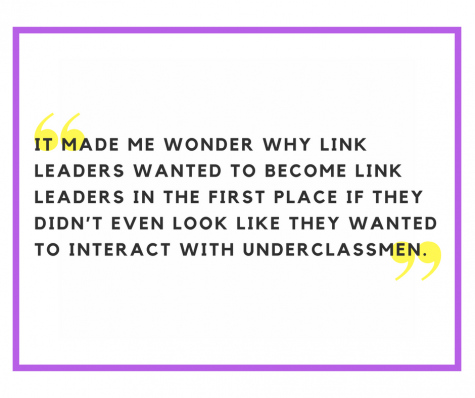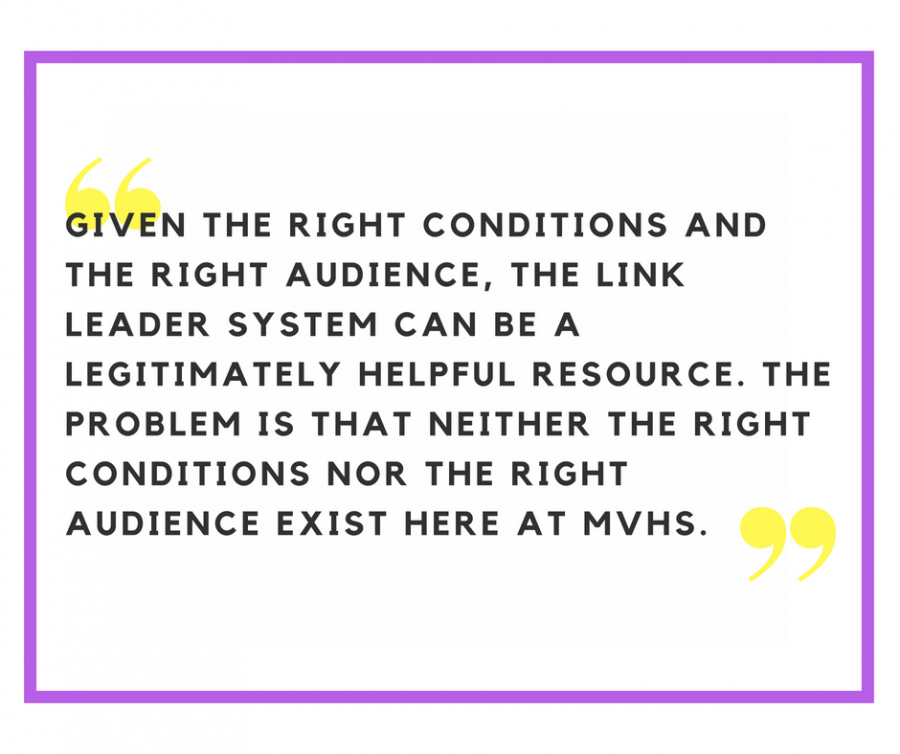B for Effort
Link Leaders are ineffective in a population of apathetic underclassmen
May 24, 2018
It’s astounding how much my motivation to become a Link Leader decreased when faced with the prospect of waking up early on a Wednesday to go to a single mandatory meeting.
I think, at one point, I really did want to be a Link Leader. I thought it’d be fun to guide the underclassmen around their new high school lives. Being able to miss class to host some flimsy activity like a bear-trap-hunter game seemed like an added plus as well. But the day before that mandatory meeting, I mulled over the drawbacks of actually becoming a Link Leader, ultimately deciding that additional “leadership experience” on my resume was not worth talking to populations of largely apathetic underclassmen who only viewed Link Leader visits as a way to waste class time.
Given the right conditions and the right audience, the Link Leader system can be a legitimately helpful resource. The problem is that neither the right conditions nor the right audience exist here at MVHS — the success of the Link Leader program depends on the enthusiasm of Link Leaders to not only facilitate discussions in the classroom but also outside of it. It’s also heavily dependent on the enthusiasm of underclassmen to be hand-held through the first year of their high school lives. Neither of those conditions exist. As a freshman, I was excited at the prospect of entering high school and finally being treated maturely. But the activities that Link Leaders usually give to freshmen that are supposed to promote team building or build character only serve to embarrass and patronize freshmen that don’t need or even want to play glorified hopscotch with the rest of their classmates.
I will concede that Link Leaders can occasionally have useful activities for freshmen to do, like teaching them how to manage their time effectively. But there’s no point in having Link Leaders miss potentially valuable class time in order to do the same job that guidance counselors are meant to do. While it can be helpful to have an upperclassman teach underclassmen to show them that they’re not alone in their experiences, more often than not, it ends up looking more like a forced attempt to encourage camaraderie among classmates.
At the beginning of freshman year, Link Leaders seemed to parrot the same message they were told to, encouraging freshmen to keep in contact with them and to look up to them as mentors for their high school lives. But I’ve personally never known a single Link Leader who went out of their way to act as a mentor outside of the required classroom sessions, nor have I known any underclassmen who actively sought out Link Leaders for advice. The first time I met Link Leaders in freshman year, they didn’t look particularly enthusiastic about their jobs; they looked disinterested in the activity and looked like they wanted to go home more than anything else. It made me wonder why these people wanted to become Link Leaders in the first place if they didn’t even look like they wanted to interact with underclassmen. The freshmen feel what their leaders feel, and Link Leaders are no exception — it’s very unlikely that anybody would feel encouraged by any group of people, whether they be teachers or other students, if they aren’t encouraging.

Ultimately, I appreciate what the intentions of the Link Leader program, and I think it could be more effective if both Link Leaders and underclassmen were intrinsically motivated to participate in Link Leader activities. But because this motivation doesn’t exist, the program is ineffective with underclassmen that don’t want to be walked through high school as if they were back in kindergarten. This motivation can’t come from regressing back to elementary school and teaching kids how to play hopscotch, nor can it come from trying to make Link Leader activities more “relatable” with forced memes.
The Link Leader program in its current state isn’t what underclassmen need. They don’t need to be led. They need to be treated maturely, like high schoolers rather than overgrown middle schoolers. They need to grow into themselves, learn for themselves and make their own friends. A bunch of tired upperclassmen who look like they’d rather be elsewhere won’t solve that problem. A change in attitude towards freshmen will.


















